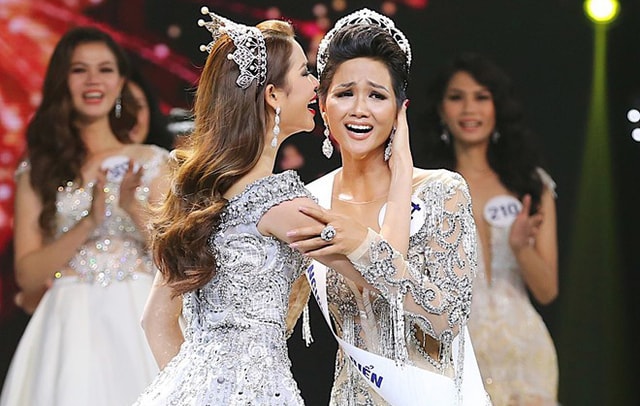World's 'mouth' about women
Beauty queens must carry values outside the contest. They become the center of aesthetic, moral, and cultural conflicts of that community, region, and nation.
Why do people watch beauty pageants? If the answer is honest, it is purely for entertainment. Watching competitive contests is one of the oldest and most enduring pleasures of mankind. From the fights between animals, humans, humans… in ancient times to sports competitions and beauty pageants today, there is essentially no difference.
The only difference between beauty queens and gladiators is simply gender advantage. Gladiators compete in physical strength, beauties compete in beauty. The goal of beauty queens and gladiators is the same, to win against their opponents and seek the praise of those who pay. The ultimate goal of the organizers is still profit, from ticket sales to advertising.
|
| H'hen Nie - Miss Universe Vietnam 2018 (right). |
The difference between the gladiators of old and the beauty queens of today is choice.
Ancient Roman gladiators were forced to muscle their way into the aristocracy’s bosom in exchange for food, or freedom. Today’s beauty pageant contestants voluntarily enter contests in search of titles, opportunities, and of course, money. They can choose to participate or not.
In the ancient Roman arenas, when it was always considered a form of entertainment, the winner could be anyone, as long as he was the last person standing after the fights.
Nowadays, beauty pageants are given more glamorous looks than their inherent nature, becoming representatives of the beauty of women in a region, a community, even a country. People no longer see beauty pageants as a form of entertainment.
Beauty queens must carry values outside the contest. They become the center of aesthetic, moral, and cultural conflicts of that community, region, and nation.
If beauty pageants were limited to a group of people with the same value system, and the judges were capable of representing the values of the group of people paying for them, the results would never be controversial.
The young girls participating in the contest are not at fault, no matter what beauty they represent. However, they become the center of a value conflict when the contest they participate in has its concept deliberately swapped. They become national beauties but their values are determined by a few judges.
The glamorous beauty pageants and the arenas are essentially no different in that people become tools for entertainment. But while the arenas have gradually become more civilized thanks to laws to limit violence. On the contrary, the beauty pageants continue to wear a glamorous shell, values beyond the sale of pleasure. That is what increases the cruelty of the world's tongue on the female body.

